#I said a necromancer alone. I have you
Explore tagged Tumblr posts
Text

Gideon and Harrow, fight me
#the locked tomb#griddlehark#gideon the ninth#tlt brainrot#I said a necromancer alone. I have you#one flesh one end#Catholocism? In my lesbian space necromancer book? More likely than you'd think.
123 notes
·
View notes
Text
I like doomed narratives but my ultimate Wizard101 NPC ending is the Young Wizard living in a nice secluded place with all their friends (all the necromancers, Ceren, Nolan, fuck you Boris you can live outside, Dasein, the Schismist Soldier, Mellori and the Bat) like a little village but they're all roommates and they do things like farming and brewing hot tea on Sundays free from Ambrose and the rest of the damned Spiral
#ik thats a lot of people HALSJDLDHDH#but in my version of Wizard101 that's everyone's ending. they get to heal together#i know i said all of the necromancers but i think i like it better if duncan was like maybe separate#not because i hate him but because im a huge believer of not being able to heal when the person who hurt you is right there#AND EVEN THOUGH WE DIDNT HURT HIM ON PURPOSE we're still a source of his trauma and i cant see duncan living with us right away yknow#like maybe later on in life but i like him better on his own off in the spiral to see the world and humble himself#*with artur and susie because he loves them#BUT YEA my wizard lives with everyone else at the Very End. fuck you ambrose /lh but /srs#the odd ones out honestly are ceren and nolan bc iirc in canon they dont go thru any type of shit. theyre fine#the rest of the group i mentioned have FLASHBACKS. theres some Trauma Periodt. in their cereal for breakfast#but i mean ceren and nolan can come if they want its fine#i MEAN IT about boris he CANNOT COME#yeah i said the schismist soldier. thats just my personal fantasy ik he hates us#here i am saying duncan cant be around us but thr schismist soldier ABSOLUTELY cannot be around us. but in my world he can! im a hypocrite!#itd be funny if he was still like. just a liiitle bit obsessed but its not because of his inferiority and god complexes he's just gay for us#......yeah im biased okay look he's hot leave me alone /lh#wizard101#w101#wiz101#text posts
20 notes
·
View notes
Text
I don't think any protagonist can ever top Wei 'Yiling Laozu' Wuxian. No one is doing it like him. He is an icon. He can shoot arrows blindfolded. He is a prankster. He falls for a boy and decides immediately that he must have said boy's attention on him at all time. He is necromancer exacting his vengeance. He is just three years old. He is a flirt. He has his first kiss in his twenties. He does not remember your name. He does remember that one song his crush sang to him in a cave when he was injured and feverish. He is a sunshine boy. He survived the hell of hells. He died and was unhappily brought back to life. He's the bizarre genius, the miraculous hero, the force of the rebellion, the flower that blooms alone. He walks the single plank bridge alone. He is the awesome gay uncle who knows everything. He is a pretty boy. He is the most moral, steadfast person you know. He is just a man throwing flowers to his love. He rips his hard won talent out to repay a debt that never was. He is a sister's boy. He is an abuse survivor. He is an urban legend. He is one of the most handsome men of his time. He has so much trauma. He plants children like radishes. He threw the arrow he was shot with from a rooftop and killed someone. He is a talented musician. He is a scheming fox. He can drink you under the table. He is so fucking tired of this bullshit. He has probably long since burned his tastebuds with the spice he puts in his food. He is broke. He kisses skeletons on their hands in gratitude. He confesses his deep, abiding love in the middle of being held hostage. He attempts the impossible and succeeds. He is an untamed hero, standing against a world condemning the innocent. He is everything.
#wei wuxian#mdzs#*me appearing out of nowhere after eight months with starbucks*#writing this I know I have probably missed many things#so feel free to add on to this#Also me just copying JC's entire spiel in the BM right onto this
7K notes
·
View notes
Note
I would like to request the Monster Trio’s and/or Jin-Woo’s reactions to f!reader getting hit on by another guy! Perhaps integrate Jin-Woo into the One Piece world too?
I decided to include Jin-Woo (: he ate a devil fruit similar to Moira’s.
BACK UP & WATCH OUT
– sfwish

“Aye baby, what are you doing here?” A man asked you as you sat at the bar.
“Waiting for someone.” You answered firmly. “And you’re definitely not him.”
“Don’t be like that, babe,” he replied, sitting on the wooden barstool next to you. He scooted closer and looked at you curiously, gaging to see how far he could push you.
“You shouldn’t-” you started, scooting away.
“Pretty girls like you don’t last long in places like this.” He whispered, putting a hand on your thigh. “Let me pay for your drink and-”

“And what?” Zoro asked, resting his hand on the hilt of his swords.
The man looked up and frowned. “Why if it isn’t the famous Roronoa Zoro. Are you here for this vixen?” He asked. “Sorry but she’s going home with me.”
“No she’s not.” Zoro easily grabbed the man by his collar. The customers at the bar left the fray alone, not wanting to be Zoro’s next prey. “Leave her alone and get the hell out.”
Shaking from fear, he nodded his head and dashed out of the bar, not looking back. Zoro sighed and sat next to you.
“Sorry I’m late, I got lost.”

“-and that is no way to treat a lady.” Sanji exclaimed, his tone firm and unforgiving. “Despicable behavior.”
“Jealous?” The man asked, putting his hand over yours. You instantly pulled away, frowning from his sudden form of affection.
“Can you not!”’ you started.
Sanji’s face was red with fury. “She’s not interested.”
“Oh she definitely will be after I-”
Sanji lit a cigarette and pushed the man’s chest with his foot. When he was on the floor he scrambled backwards, hoping the space between them would be enough for the cook to leave him alone.
“Talk to her again and I’ll kick your face next time.” The blond threatened, looming over him. He puffed a sliver of smoke from his mouth and motioned for the brute to leave. The man nodded and scurried away. “Ah, yn-swan!” He turned to you, his voice sweet and caring, “let’s leave! I’ll make you something on the ship!”

Before he could finish his sentence, you saw Luffy’s long rubber fist punch the man off the stool and crash into a few more tables and chairs, making customers around him scatter.
“Hey!” Luffy exclaimed happily, running up to sit next to you. “Sorry I had to knock that guy out. There were no open chairs near you except his!”
You laughed, knowing that Luffy clearly didn’t know the situation you were in before he arrived.
“It’s a good thing you knocked him out,” you replied, seeing the man passed out on the floor. “He wasn’t good company anyway.”

A dark, shadowy hand slowly rose from the floor where he sat at, the dark aura not phasing your unwelcomed guest because he was focused on you. You easily noticed the purple hues, for you were used to them. Jin-Woo toyed with people, especially when he was bored.
“…so what do you say?” The man asked, not feeling the eerie presence around him.
“Not interested.” You answered calmly, taking a sip from your drink. “I’m still waiting for someone.”
“Yes, she is.” Jin-Woo said in a dark tone as his full body emerged from the shadows behind the man.
“Now who the hell are you?” He spat as he turned around.
“Someone who you don’t deserve to speak to.” The man didn’t even have to say anything else before he stormed out of the bar.
“Damn you didn’t have to scare him like that.” You smirked as the necromancer sat next to you.
Jin-Woo closed his eyes. “He was a waste of my time and yours. Now. What did you want to talk about.”
#one piece x you#one piece x reader#one piece imagine#one piece imagines#solo leveling x reader#solo leveling x you#one piece headcanons#solo leveling headcanons#zoro x reader#luffy x reader#sanji x reader#sung jinwoo x reader#sung jinwoo x you#sung jinwoo headcanons#trafalgar law x you#trafalgar law x reader#vinsmoke sanji x reader#sanji x you#luffy x you#monkey d luffy x reader#monkey d luffy x you#headcanons#multi headcanons#mixed headcanons#mixedheadcanons
361 notes
·
View notes
Text
You know when you're at a dinner party with God and things start to get...weird...? It's Maundy Thursday, and it's time for more Bible study for fans of weird queer necromancers!
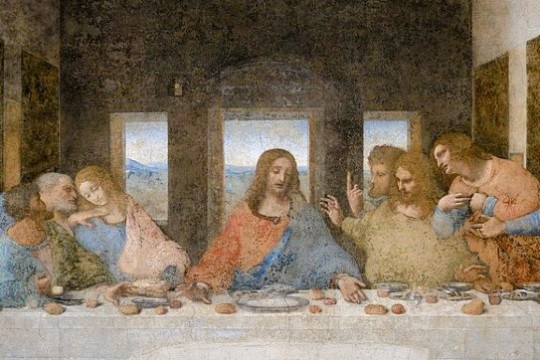
It's currently Holy Week, the week where liturgical Christians reenact the events of Jesus' death and resurrection in real time. And today, it's Maundy Thursday, which commemorates the Last Supper, where Jesus ate with his friends before he was crucified.
Before we get to the Locked Tomb, what's so special about the Last Supper?
There are actually a few significant things that happen during the Last Supper, but this is where Jesus introduces the concept of communion:
Now as they were eating, Jesus took bread, and after blessing it broke it and gave it to the disciples, and said, “Take, eat; this is my body.” And he took a cup, and when he had given thanks he gave it to them, saying, “Drink of it, all of you, for this is my blood. - Matthew 26:26-28
This isn't actually the first time Jesus has told his followers they will need to literally eat him:
So Jesus said to them, “Truly, truly, I say to you, unless you eat the flesh of the Son of Man and drink his blood, you have no life in you. Whoever feeds on my flesh and drinks my blood has eternal life, and I will raise him up on the last day. For my flesh is true food, and my blood is true drink. Whoever feeds on my flesh and drinks my blood abides in me, and I in him. - John 6:53-56
If you're thinking that sounds a bit intense, you're not alone - the Bible says that "many" of his disciples left after being told that they were apparently going to have to eat Jesus to be saved and resurrected.
While many Protestant denominations take this symbolically, Catholicism teaches transubstantiation: that when the priest prays over the bread and wine at mass, they really do become Jesus' body and blood.
With this in mind, let's circle back to necromancers:
"Overseas to Corpus. (She likes the word corpus; it sounds nice and fat.)"
This is probably Corpus Christi College, Oxford (named after the Solemnity of the Most Holy Body and Blood of Christ, where the church celebrates the real presence of Jesus in the eucharist). The symbol of the college is a pelican - there's even a fabulously gilded pelican atop the sundial in their main quad.
What do pelicans have to do with the eucharist? Quite a lot, actually... The pelican is a really old symbol for Jesus, because it was believed to feed its young on its own flesh and blood in times of famine. The pelican on the Corpus Christi sundial is pecking at its own chest.
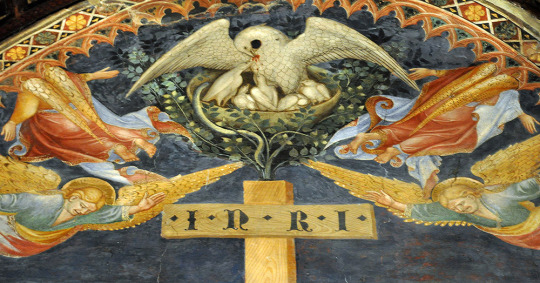
The pelican, like Jesus, was believed to give its own body to save those it loved.
Okay, so we've talked about Jesus, and weird cannibal birds, but why is this relevant to necromancers?
Specifically, the necromancer, the Necrolord Prime. John Gaius styles himself as "the god who became man", echoing Jesus as "the word became flesh". His entire pastiche of divinity is a sort of bootleg Catholicism. But while Catholicism posits Jesus' offering of his own body as foundational to the salvation and resurrection of humanity to eternal life, John's godhood relies the exploitation of other's bodies as the foundation of an empire of eternal death.
I've mentioned before in discussing Lyctorhood, how vampires have been understood to represent a sort of inversion of the eucharist because instead of consuming Christ's blood to receive eternal life in heaven, they consume other people's blood for an cursed eternal life on earth. John, and the Lyctors who followed him, gained power and eternal life from the consumption, body and soul, of another person.
In Catholic theology, Jesus offered his own body to degradation and death for the eternal salvation of humankind, but John forcibly consumes someone else's in service of his own apotheosis and immortality, dooming humanity in the process. He wants to be a Catholic flavoured god, but without the suffering that entails. But he's perfectly willing to outsource that suffering to others.
There's something just achingly awful about Alecto liking the feel of the word "corpus" - "body" - when she so hates the body that John constructed for her. John describing Alecto as "in a very real way" the mother of humanity and the mother pelican on the Corpus sundial rending her own flesh for her children. John forcing the earth into a personification of femininity and playing Jesus on another's sacrifice. His daughter, unwillingly trapped in her own corpse walking around with the wounds of her significant self-sacrifice like the resurrected Christ but yet again another body exploited by John in support of his performance of godhood. It brings to mind a very different fantastical engagement with Catholicism, where in the Lord of the Rings Tolkien - riffing on St Augustine - suggested that evil cannot create, it can only mock and corrupt. The ethics of The Locked Tomb may be messier than that, but there's something indicative in how John shies away from his creative powers - his abilities to grow plants, and manipulate earth and water - in favour of his dominion over death.
The metaphysical world of The Locked Tomb is clearly not intended to be the same as that of Catholicism. But with hindsight, perhaps John was onto something when he was surprised that he didn't "get the Antichrist bit" from the nun too.
John isn't the Antichrist. But he is, thematically, anti-Christ.
If we're talking about John and Jesus, there's also, of course, the question of Resurrection. But we've got to go through Hell and back before we get there on Sunday...
464 notes
·
View notes
Text
stolen planets
this is a minor point of order, mostly unrelated to the stuff about the River that I'm trying to get to later, but it's an idea I've never seen anyone post about in their consideration of John's empire and agenda.
early on in AYU, while dwelling on her miserable slog through convalescence, Judith mentions overhearing an inscrutable bit of BOE slang:
The stomach pouch was removed on a previous excursion to what they said was an abandoned “steal planet.” I understand that they use the word “steal” for what we would term “shepherd.”
I say slang because why else would you use the present tense verb in place of a past-tense adjective here, if not as colloquialism? however, this slang appears nowhere in NTN, where we spend great chunks of time airing out BOE vernacular.
Reading between the lines a bit, we can easily guess what the BOE troops meant by "steal", because they spend the rest of the short story trying to get Judith connected to one:
The ship was a Gorgon-class vehicle... it was the last time they had tried to design a light craft that still had room for a stele. Blood of Eden must have captured or stolen one intact.
However, this is still an unusual way of speaking; we've never exactly heard of a "stele planet" before, and we know BOE had to get their stele from Mercymorn, as opposed to finding one in the corpse of a flipped planet.
Looking for 'plot holes' and errors in the continuity of a magic system is rarely productive, but if we comb back over HTN, AYU, and NTN, there appear to be some interesting inconsistencies in the presentation of stelae.
In HTN, John describes stele travel as vaguely dependent on obelisk infrastructure, forcing his Lyctors (who can travel freely) to lay down more of them - the reader is encouraged to that stelae are warp drives, and that obelisks define the regions a stele can transit between.
God said, “We came up with the stele instead, and the obelisk, which are less to do with travel than they are to do with transmission. But there will be times in your future when you will have to move unfettered by needing an obelisk, and even times yet to come when you will fulfil the sacred Lyctoral duty of setting obelisks...”
“Where we are going there are no obelisks for a stele to hook on to,” said the Emperor.
Certain asides in AYU and NTN double down on this interpretation, making references to "obelisk anchors", and establishing the need to locate an anchor at one's intended destination before embarking on stele travel:
Someone else said more clearly, How will we know where the anchor is? And the voice said, I’ve given you the blasted co-ordinates, haven’t I? It won’t be in the ship’s stellar registry, so you’ll have to do the input work yourself. And you must follow the route I’ve given you afterward.
“The Ziz isn’t Cohort standard. And it’s not as big on the inside as you think. Look at the windows—see how there’re none on the back end? It’s mostly engine. Not plated either. It’ll get to sublume without many problems … but it definitely doesn’t have room for a stele. Camilla is right. It can’t travel by obelisk anchor.”
However, AYU makes it clear that a stele also has a role to play as an anchor:
Under this duress I told them I understood how the stele worked but had no ability to use it myself... I said one necromancer alone would not be able to use it as an anchor and that it needed to be energised on a thanergenic planet, so it would never be of any use to them.
NTN even seems to flip-flop around, with people locating a stele to anchor onto, and using obelisks like an array of engines rather than to define one end in a point-to-point transition.
"The Warden convinced the Oversight Body, convinced the Sixth House to come with us. We showed them the secret of the installation. We helped them find a stele that would anchor such a big thanergy transition … which means, we helped them move."
"How’d you get it through a stele? With the weight of that thing, you’d never survive River displacement.” “Five hundred and thirty-two obelisks,” said Camilla.
Here's my tinfoil hat for you: if a stele and an obelisk both have similar roles to play in FTL travel - as suggested by their both being named after words for monuments - then the obelisk should have a similar necromantic nature. They may both be similar names for the same thing, or two different versions of the same thing, at least.
If nothing else, given that they're clearly both "anchors" rooted in Fifth House spirit magic, obelisks and stelae must have similar demands for upkeep and maintenance. And how can a Lyctor possibly set up such an obelisk out in space?
We know that each anchor relies on great quantities of freshly oxygenated and thanergy-enriched blood - that is, each anchor is sustained by a thanergenic fluid still flush with thalergy, per Pyrrha's comments to the effect that blood wards are more thalergy-rich than bone wards. Such anchors also have to be charged with power from thanergy-rich planets.
Mercymorn was able to produce an automatic oxygenation unit via the use of flesh magic, but blood cells need external organs to stay alive. For purposes of sustaining a very large anchor with life and death, a simpler option might be to make your runes with very wide chisel cuts or specially treated surfaces, so that they can't be blotted out by debris, and then leave them in a liquid ecosystem. Place them at the bottom of a water basin teeming with microorganisms, and then allow the micro-ecology to start dying off in the same thanergenic background radiation that you're using to charge up the anchor monument.
For example, by carving into the seabed under the salt-water ocean of a dying planet - a stele planet.
99 notes
·
View notes
Text
One big theme in the locked tomb is the importance of community, and especially with the framework of those with a disability. Harrow in HTN has two different worlds she is interacting with, one in which the people around her don't give a shit to help her at all, and in that world she dies. Then in the river bubble most everyone refuses to leave her on her own, thye chose to help her, many despite not knowing her. Compare Ianthe's speech to Harrow in the prologue, the way she frames it is Harrow will not survive if she doesn't accept her help, and that Ianthe specifically is the only one who can. Her speech intentionally or not implied that she sees Harrow as weak. Of course Harrow rejects her help. Whereas when Harrow is asking the others to not help her defeat the sleeper, many frame it as helping her is just being part of something they already wanted to do or that they benefit from (the ones that come immediately to mind being Abigail, Dulcie, and Marta). They help her but don't make her feel like she owes them anything for doing it. Which is the opposite of Ianthe, when Harrow makes her the bone arm, Harrow doesn't want anything in return but Ianthe explicitly states she doesn't want to owe her.
The same is true in Nona, Camilla, Palamedes, and Pyrrha don't really owe it to Harrow to keep her/her body safe. It's obviously a lot of work, the equivalent to raising a child, but Nona is never treated as a burden. And I hate to imagine what it would have been like for Nona had she been alone, she said she couldn't even remember to walk at first. And this is all over the series, Dulcie lovingly saying Palamedes invented the breathing tube for her. Camilla and Coronabeth caring for Judith when they were captured. Even in places that aren't tied to disability, a necromancer and cavalier HAD to work together to complete the challenges. The way both of the Palamedes' detective short stories depend on the help another person lends him. It means so much for a story featuring characters with a disability to emphasize that it is okay to need other people, that we all do or will. That you don't need to push yourself to extremes to keep up (Harrow has this mindset in both books and in both she succeeds the most with the help of others, not alone).
To go even further, it isn't just about helping one another, but the importance of not keeping a score. Don't think you have to make up an equivalent amount of help to someone else. One of the things Gideon emphasizes as the most hurtful in Harrow's rejection is the rejection of her help. Palamedes says that he feels bad for using Camilla for his agenda and she answers that it was never his agenda. Him needing her body was something Camilla would never think twice about giving. They would do these things because they love them. This is just me repeating themes but I'm so used to the Western independent mindset, and disability porn of "if you just try hard enough" this series is a breath of fresh air
664 notes
·
View notes
Text
Round 3, Match 1
The Reverend Daughter Harrowhark Nonagesimus (The Locked Tomb) vs Mercedes von Martritz (Fire Emblem: Three Houses)

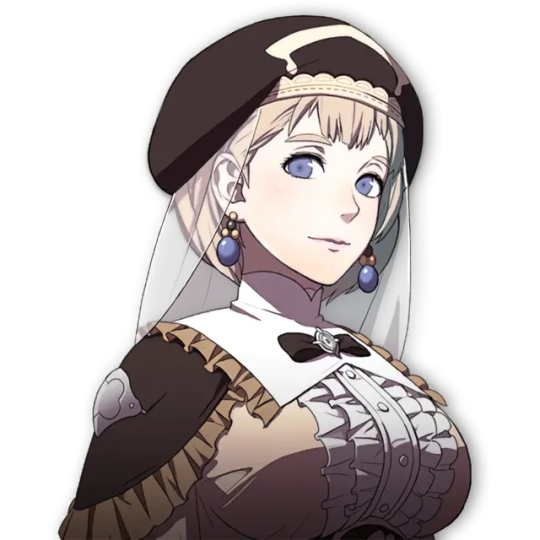
Harrow is a nun of the Ninth House. She's been described as a space goth necromancer fantasy sci-fi bone nun.
Mercedes von Martritz is a nun of the Church of Saint Seiros at Garreg Mach Monastery.
The Reverend Daughter Harrowhark Nonagesimus
She’s great. She has so many fucking problems. She’s been running the goth space convent since she was 10. She’s puppeting her dead parents around. She doesn’t like tastes. She is extremely passionate about bones. She’s locked in a twisted bond of love and violence and devotion and sacrifice with her childhood best enemy. She lobotomized herself to preserve the best enemy’s soul. She’s been in love with the corpse of the Devil all her life. She goes around in bone jewelry and skull face paint. She’s a sad wet cat who was born in a cardboard box all alone, etc. She chopped another woman’s arm off and regrew a skeleton arm, in a sexual way. She has awkward little fireside chats with God where he makes millennia-old meme references at her and she does not drink the proffered tea. She saw God make a your mom joke and it “destroyed some cavern of her reverence”. She’s even gay. She’s everything.
Mercedes von Martritz
Mercedes was born to the fallen House Martritz and bore a minor Crest of Lamine, a special type of blood that gave it's bearer enhanced abilities. Her father died shortly afterwards and Mercedes' mother remarried into House Bartels, giving birth to Emile von Bartels, who also had a minor Crest of Lamine. Mercie's stepfather was uncaring and only married for his new wife's crest which led to said wife's departure from House Bartels. She ran away with only her eldest child to the Kingdom, where Mercedes would really start her own life as a student of Fhirdiad's Royal School of Sorcery. There, she befriended Annette Fantine Dominic and both girls would later attend Garreg Mach Monastery together. Mercedes is a kind soul with a soft voice and the ability to speak her mind. She's the eldest student attending the Officer's Accademy and takes it upon herself to be a shoulder of support for her classmates, no matter their origin. When the timeskip hits, Mercie returns in a nun's garb and expresses reinforced belief in the Church, even in the route where you fight against the Archbishop. I find her extremely fascinating due to her sub-plot with her brother, Emile. Mercedes held deep regret for leaving her brother behind in House Bartels despite not knowing that he had chosen to stay behind to protect her and her mother. Emile later returns as The Death Knight, a general under the Flame Emperor's command and his story with his sister changes depending on the player's route. Should the player oppose the Flame Emperor, Emile and Mercie can reunite briefly, with The Death Knight granting Mercedes a relic that can only be operated by their Crest before dying in her arms in a later battle, happy to be with his family once again. In the event that the player does side with the Flame Emperor, The Death Knight becomes playable alongside his sister, revealing thatthe years spent in House Bartels changed him, giving rise to two distinct personalities: Jeritza von Hyrm and The Death Knight. Jeritza had been a teacher at Garreg Mach, serving as a spy to the Flame Emperor while The Death Knight quelled his bloodlust under the Flame Emperor's orders. In this route, Mercedes reaches out to both Jeritza and The Death Knight as their elder sister and the exchanges they have are some of my favorites in Fire Emblem history. Also Mercie is bisexual and both M!player and F!player can marry her in the end, regardless of route. Love her for that
#best nun tournament#Round 3#Poll#Poll Tournament#harrow nonagesimus#harrow the ninth#The Locked Tomb#tlt#Mercedes von Martritz#Mercedes von Bartels#Fire Emblem#FE16#FE3H
65 notes
·
View notes
Text
MCSR Pokémon Teams
some explanations included but largely based on vibes alone
i got a bunch of suggestions from mutuals so if that’s you hiiiii thank you :3
(disclaimer i don’t know shit about competitive so these teams are nawt viable for that at all)
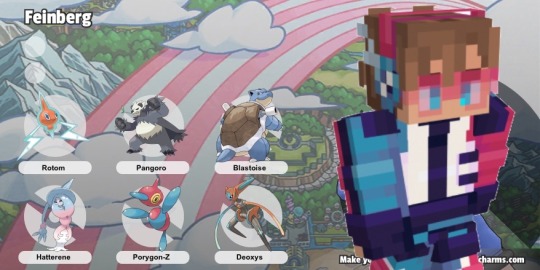
- i knew i wanted him to have an electric type and i landed on rotom for its various forms and versatility
- pangoro because i wanted him to have a fighting type and also bc of pandas in AA
- blastoise is a full soul read idk
- hatterene bc of the colors
- porygon z also for the colors and also bc it seemed fitting (this was a gigabrain lompleg suggestion everyone say thank you lompleg)
-deoxys speed form i feel is self explanatory
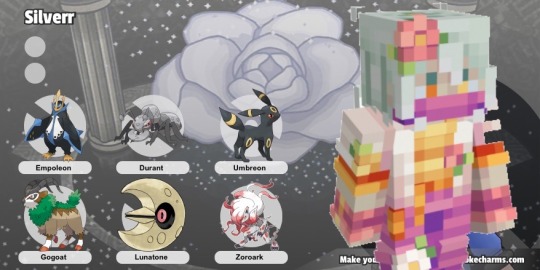
-ngl a good half of this team is straight vibe picks with no like REAL reasoning
- durant is silver in color everyone say wow
- gogoat as a callback to his skin w the horns
- the hair on the zoroark reminds me of how people draw his hair
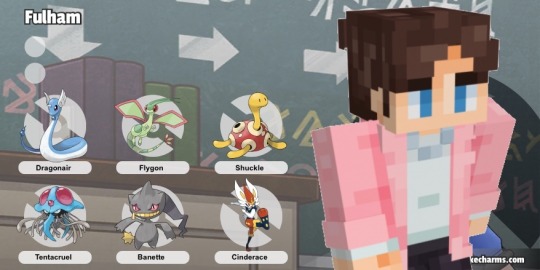
- when i asked in chat he said his favorite pokémon was dragonair so he gets one
- flygon’s little eye things make me think of glasses
- shuckle
- a lot of people were of the consensus he should have a water type, i picked tentacruel largely bc the things on its head match flygon’s eyes ngl
- banette reminds me of phantom house of nightmares fulham for some reason
- british football playing pokémon from the british region
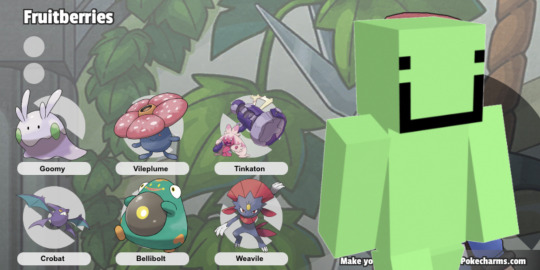
- similar to fulham and dragonair, fruit likes goomy so he gets a goomy
- iirc he had an event skin where he was a vile plume
- tinkaton gives me huge fruit energy that thing is a little deranged (in the best way possible)
- he’s associated with bats fairly often so he gets a crobat
- bellibolt’s goofy lil face reminded me of :]
- weavile is agile i don’t have that much more reasoning
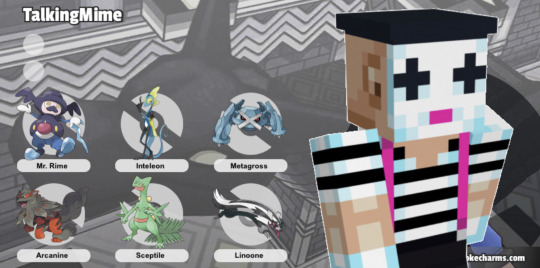
- mr rime is here because i despise the pokémon mr mime
- and also gold suggested it would be funny as an alternative
- inteleon and metagross are both pure soul reads
- moots thought hisuian arcanine would be good to a.) give him a dog pokémon and b.) represent captain mime and i agree
- i’m gonna be so real the entirety of my reasoning behind sceptile is sometimes when mime gets snarky i basically imagine that’s his facial expression
- look at linoone’s color scheme and tell me i’m wrong
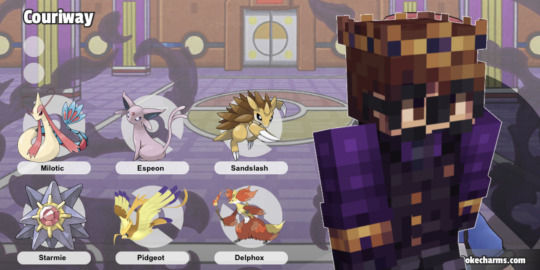
- couri likes milotic so he gets a milotic
- espeon and starmie are both purple and give off couriway energy to me
- shiny pidgeot can fly and is in couri colors!
- delphox is a reference to my mcsr d&d stuff where i made couri a wizard
- idk why sandslash i just like him
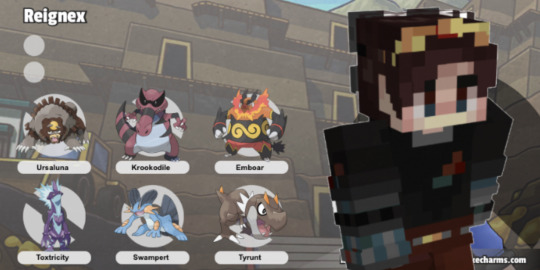
- shot-in-the-dark pick city, population: reignex
- i basically only have reasoning for 3 of these
- ursaluna is a bear
- emboar reminds me of piglins and hoglins in the nether
- low key toxtricity was a suggestion i was a fan of
- other than that i made choices based off gut feeling alone
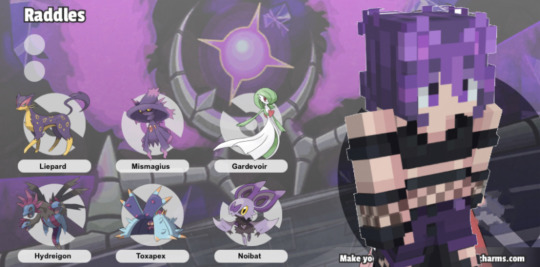
- purple cat liepard yay
- mismagius makes me think of that super cool vio art of raddles as a necromancer
- gardevoir is pretty enough said
- hydreigon and toxapex were both purple and had fitting energy imo
- noibat reminds me of her blockwars purple phantoms skin
uhh that’s all i’ve got for now! maybe more later or if you have teams for people i didn’t come up with you should totally add them onto this post :3
#again i had lots of help from mutuals just bouncing ideas around w me#so thanks y’all :D#mcsr#feinberg#silverrruns#fulham#couriway#fruitberries#reignex#talkingmime#raddles#hbg
43 notes
·
View notes
Text
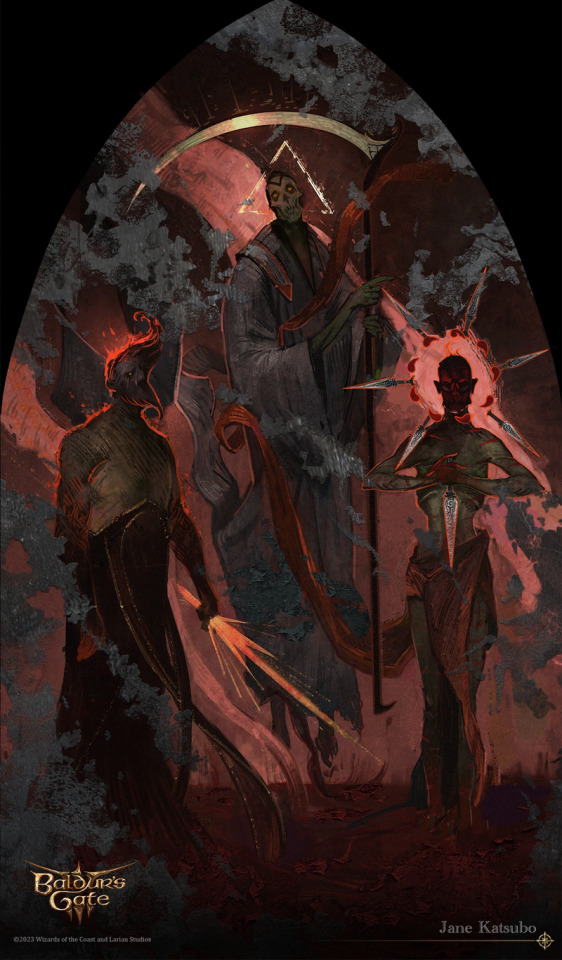
SOME ILLEGIBLE RAMBLES AND REFLECTIONS: THE DEAD THREE
Finished my first/main playthrough of Baldur’s Gate 3, and it’s had me turning over all sorts of ideas tied to Dungeons and Dragons lore. A bunch happens to be about cosmology so I'm slapping together one post about the Dead Three and a follow-up about deities more generally. Buckle up if you decide to proceed dudes. This is chunky and opinion/interpretation heavy. CW for mention (not extensive) of graphic violence and sex crimes during discussion of Bhaal and Yeenoghu.
MYRKUL
I get that there are multiple death-affiliated deities in DnD. Our buddy Jergal is the end of all things and the original incarnation of the concept. Myrkul stands for the experience of dying, decay, necromancy, graves, bones, and the fear of mortality. Kelemvor rules over the dead. Orcus is a demon lord and quasi-deity of undeath. Could prob go on.
I've read many different incarnations of death over the years. To set the stage on my Myrkul read, it bears mentioning that Terry Pratchett's Death is probably my favorite. I don't have it in me to see death as something totally malicious. It's very natural, and I tend to imagine that if there were to be an incarnation embodying it this persona would have an intimate view of all the love and grief, vulnerability and intimacy, ugliness and solitude, etc. that mortals deal with. Death has witnessed the end every living being faces, from the dawn of creation until now. Even if it isn't consciously accessed at all moments, death is ancient and experienced and not likely to be shocked by what mortals are capable of anymore. Mortals are small. Uncountably numerous though we are we are far outnumbered by the unliving. What are lives next to planets, to stars? Here I'd argue against assigning value according to how big or small something is, how eternal or how brief, how simple or complex. Everything that is, is a universe unto itself and deserves the gravity of that. It is also very mundane at the same time. To me, death needs to be able to balance the preciousness and commonality of life, of existence, on the tip of its scythe. Death needs to be able to deal with the most depraved beings to exist, but also with every beloved pet put to sleep. Every lost child or parent. Everyone who dies surrounded by loved ones and everyone who dies alone.
Initially, even knowing Myrkul in particular had been a mortal necromancer and not of particular moral standing--I had mixed feelings about him being the evilest of evil skeletons. He worked it well, but the idea of any aspect of death (or any character tbh) being flat evil felt off to me. Especially with 'we're all the protagonists of our own stories' being at work. People don't often look at what actions they'd consider to be evil then go 'I'm going to make myself that on purpose'. Disregarding morality maybe, but being evil on purpose is weird.
So I looked into further lore about Myrkul. One spot that gave me pause was that Myrkul as death (rather than the adventurer Myrkul Bey al-Kursi he’d once been) revels in inspiring fear of death and driving home experiences of loss. From what I found he isn't focused on the name of the individual holding the office of death, but for the force itself being feared. He can be bribed, and he will allow for necromancy/resurrections--but the fear and gravity of death is a sacred thing to him. Disregarding that is a pretty good way to get onto Myrkul's shitlist. I want to take a moment to emphasize the importance of Myrkul focusing on his portfolio over his own ego. That is far from a given in the DnD pantheon, and like I said he's a former mortal himself. It wouldn't be out of the question for him to be a petty and insecure deity. He could have been the sort of guy where becoming a god of death by itself wasn't enough power. If Myrkul was a different person, he might have wanted people to stroke his ego and say how strong he is. He might have been someone who felt inadequate as a god without that affirmation. He could have (as a character) been unsatisfied and forever wanting/dependent upon the views of others to define himself. The fact that he DOES focus on death and decay as forces rather than himself is a big deal in reading him imo.
Anyway. Myrkul's emphasis on death as something feared got me thinking about what would cause a person to put such weight on death being understood in its negative aspect. It struck me that this is actually a very common and even important thing. You don't need to demonize death to see it, either. If you value life as sacred, the idea of life being treated as cheap or disposable is horrifying. When you love something dearly, the idea of that beloved thing being defaced is beyond outrage. It's a kind of sacrilege. People who kill as casually as breathing, who revel in the permanent destruction of someone else, become a source of horror. The absence of love creates a sort of cruelty that can't even perceive itself. And it's not uncommon for human beings in particular to partake in this. Humans dance on the graves of those they deem enemies not because they're relieved to be safe, but because they glory in the end of other lives. They don't recognize that anything of value was lost. There is no tragedy in death anymore. Every gentle moment, every vulnerability, every tragedy in their opponent's life is something to be crapped on and gloated over. There is no greater insult to life itself. Myrkul stands as a reminder that such behavior cannot stand. You can't treat life or death as cheap. To see something horrific and fail to realize the weight of its horror is itself a form of horror. The idea of a death that demands to be acknowledged for what it is, particularly by the living, imo actually denotes a level of care for life too. It might be harsh or ugly, but I don't know about evil. So while Myrkul is certainly flawed and often serves as an antagonist, I’d argue the function he performs is not only important but necessary.
And while it might vary between players, I found Aylin's enthusiastic executions and body defiling pretty uncomfortable. I understand she went through a lot and am fine with her as a character. But I think Myrkul's point stands if the audience feels even a moment of disquiet seeing her celebrate over the corpse of a broken person.
Some things are meant to be ugly.
BANE
Of the Dead Three I find Bane the most disturbing and dangerous tbh—but not for how Gortash invokes him. Way I see it, the other word for tyranny is authoritarianism on a macro-level, abuse on an individual level.
I’d argue that in life, we can only healthily control ourselves and our own individual actions/choices. We can try to persuade others or appeal to their judgment, but we can’t MAKE another person think or act how we wish. When folks attempt otherwise (individually or more broadly) it involves fear, force, deceit, or other forms of pressure. Coercion, enslavement. These fall under the umbrella of tyrannical practice to me. You treat another person as subhuman and strip them of agency.
We don’t live in a pure and ideal world. If a tyrannical person is committing crimes and denying others their free will through force, I wouldn’t call defense through force tyrannical as long as it wasn’t needlessly excessive. Power struggles exist. But the whole practice of using fear, force, deceit, or pressure to control another person is dangerous imo. They're to be utilized as little as possible.
In DnD I don’t think the fringe evil cults would be the ones most at risk for corruption by Bane. I don't think individuals or groups who prioritize self-indulgence would be most at risk, either. The most dangerous and frequent disciples of Bane imo would be within good alignment. This means followers of benevolent gods as well as the nations or groups that consider themselves to have righteous causes. ESPECIALLY those with chips on their shoulders.
When someone assumes they have and always will have the moral high ground, that they are incapable of committing injustice, that their end justifies whatever means, that it doesn’t count as abuse with the 'correct' target… that, to me, is where tyranny festers. The person convinced of their own moral infallibility is the one who sees no need for brakes and so cuts them without concern.
I’d argue everybody has a seed of tyranny in them that can be fed or starved. We feed that seed with our own indignation to become a tyrant victimizing others while still seeing ourselves as powerless. The person who first victimized you can still also be victimized by you. There isn’t a target that exists where finding joy in cruelty gets a pass.
Bane, I think, thrives on the idea that it's no problem if you're enforcing your will. Especially on people contemptible to you.
For DnD purposes, imagine you have zealous followers of idk Tyr. They are willing to do whatever it takes to enforce and spread their definition of justice. They believe in making examples of people at every opportunity. They torture, isolate, rob, and shame those they consider to be unjust or dangerous. If their victims are falsely accused—well. It’s for a noble purpose so the sacrifice is not in vain. And imagine Tyr abandons these followers as hypocrites. He no longer empowers clerics or paladins no matter how they cite scripture or brand ‘heretics’ with his symbols.
Bane doesn’t enter calling himself Bane, god of tyranny. Bane claims to follow a higher justice. Maybe he uses an avatar, maybe he chooses a Banite disciple, maybe he finds a true believer. But he argues that Tyr as an individual was never ultimately what those zealots stood for—it was justice itself. And if Tyr has turned traitor to his own portfolio, mortals need to go over his head to the core concept and implement that. Bane offers a name that suits his purposes and begins sourcing power to clerics and paladins instead. And throughout, as the zealots commit increased atrocities against those they deem dangerous or evil they fail to realize they’ve spiraled into evil alignment after all. They’d think they were either just as good as they’d always been OR BETTER. The compassion of Ilmater is spent on the depraved and corrupt as far as they’re concerned.
I think the real threat of Bane is that he should be 100% capable of corrupting an otherwise heroic party member if they aren’t wary of that capacity in themself. You suddenly find your friend who listened to your problems and supported you through awful shit mocking a person sobbing on the ground as they kick them. And that friend looks betrayed and hurt (or outraged) if you challenge their actions, because they think you should know exactly how disgusting this piece of shit is and how much they deserve the abuse. And even if you concede that individual case—it’s not the only one. The slights worthy of torment become smaller and smaller. A thought or word out of line betrays the ideology of an evil alignment, with the only solution being to beat thoughts and words out of the target until they can only repeat approved ideas back. And even then, it may not be enough.
If it was explicitly confirmed that the deity the zealot followed was Bane all along, the zealot might genuinely not believe it. They might get pissed at the very suggestion. What they do against the wicked isn’t tyranny after all. They’re righteous.
Denial doesn’t serve to disempower Bane in the least if tactics remain unchanged.
BHAAL
I’m holding off on more detailed Bhaal thoughts until I complete a dark urge run, but I’ve listened to lore on both him and the demon lord Yeenoghu recently—and I think there’s room for a really cool potential contrast.
Yeenoghu Lore
Providing this particular video link for the curious, as a way to help illustrate what I’m drawing from.
Yeenoghu holds the title as demon lord of slaughter. He glories in filth, rape, excessively graphic murder, torture, violence, and playing with corpses along the way. He’s meant to come across as a bestial, self-absorbed, remorseless desecrater. And when I say bestial, I want to draw attention to a particular IRL factoid that might be worth considering.
I love animals to bits. I don’t think animals generally contemplate morality the way humans do just due to cognitive differences and limitations. I also think it’s important to remember that humans are ALSO animals, so certain things umbrella’d under ‘human experience’ would probably apply to at least some animals too. If there are human altruists and human serial killers, we should be able to expect that animals likewise have some altruists and some serial killers within the scope of individual variation.
Cruelty is not exclusive to humans. Orcas will essentially torture smaller animals to death by flinging them into the air with their tails repeatedly like balls until repeated beatings and suffocation kill them. Dolphins commit rape and chew on live puffer fish to get high off the toxins. Chimpanzees are a horror unto themselves with cannibalism and mutilation and basically whatever atrocity they can commit. Wolves and cats sometimes hunt to excess just for the joy of it and don’t eat all they kill. Hannibal the swan (as a specific and notably homicidal individual) beat and drowned any other swans visiting his pond and showed his signet how to do it. I could go on. Some cases it might be a matter of the animal not having theory of mind to recognize that they are inflicting pain on another conscious creature. Other times, like with pissed off chimpanzees, they know EXACTLY what they’re doing and it’s on purpose to cause maximum suffering.
I think Yeenoghu should embody a little bit of both propensities. He’s just utterly self-absorbed and doesn’t give a fuck about the experiences or perspectives of other living things except insofar as they impact him.
Bhaal I want to research more like I said, but one thing I remember from my initial play through was finding a note from the Dark Urge to Orin.
Little sister, whatever in the Gray Wastes are we going to do with you? Bhaal will never care that you waste your time, posing your corpse-dollies. Bhaal doesn’t care whether you give him the corpse of a pauper or a king. At the end of the day, all Father wants is death in droves, death in numbers. To sap away the life of this dull world as swiftly and widely as we can. You plan, you plot, you prevaricate, and you waste his time. Bhaal doesn’t need us to think. He needs us to kill. You kill beautifully, and have talents in your shapes’ magics that I never will. But you do not understand Lord Bhaal. Perhaps it is a failing of your diluted blood, as a mere grandchild. I am his sole living pureblood. I will accept no challenge from you, until you show some damned respect.
To be honest this is interesting af to me because it positions Orin a bit more in-line with Yeenoghu’s modus operandi in some ways. But what sets apart the principles of Bhaal from Yeenoghu or Myrkul?
The Dark Urge suggests the goal of Bhaal is the extinction of all life, but to be honest I’m a bit skeptical. Seems like short term thinking. Even if Bhaal pulled that off, once it’s done there is no more murder or god of murder for that matter. If Bhaal is aiming for a cessation of existence and wants everyone else along for the ride maybe that’s what he’s after, but I dunno. That seems like something fans/players/loremasters would have touched on before.
I’d like to invite this possibility for foiling instead:
Life consumes other life by nature. Animals, plants, fungi, bacteria, so forth—it isn’t just a matter of philosophy. One life cannot exist without destroying another. We need to eat. If we don’t, we die well before reproduction enters the picture. But it’s more than that… you take a step, you kill countless tiny organisms you aren’t even aware of. You swat a fly. You hit something with your car. You move gracelessly or touch carelessly, and catastrophe ensues. Etcetera.
It is inevitable that your existence will mean the end for the life of another living thing. That’s just how it goes.
It could be interesting on a LOT of fronts (both as members of the dead three and as former adventuring companions) if Bhaal acted as a kind of philosophical opposite to Myrkul the way I previously described.
If the Dark Urge’s note is to be trusted, Bhaal has no interest in ritual or glorified death per se. Bhaal would be more about the mundanity that comes through the act of killing. Life is fragile as-is and often ended by accident. Killing in its most common form is thoughtless and unconscious. To Bhaal, if every life is a universe then the universe looks meaningless. There is no importance or fanfare to any of it. If one side is ‘everything matters, give weight to life and death’, Bhaal would be ‘nothing matters, we are not capable of affording reverence to every single life and death we encounter’. More specifically, the mass deaths Bhaal favors would be a kind of illustration of the uncaring and casual relationship living things have with killing other living things. The more casual and effortless it is, the more I’d imagine it serves Bhaal. Sadism and revelry miss the point—there is no hierarchy. Suffering is inconsequential. Fear is inconsequential. Instinct is inconsequential. To live is to kill by Bhaal’s logic.
It isn’t limited to murder in the sense of a member of one species killing a member of the same species. It’s more Bhaal is the god of killing. He’d gain power from murder too sure, but also hunting, harvesting, and butchering. With these interpretations in-mind, we can actually figure out how the Dead Three might have answered Jergal's question about what worth a mortal life holds. With the disclaimer this is very much conjecture. I think Myrkul would likely be "Each life is of infinite value and merits sacrificing everything for." That lends life a heavy weight and makes death a fearful force for all. It would also mesh with Ketheric as his chosen. Bane would lean into "That depends on a person's deeds", "The only life that matters is mine", or "Depends on the mortal". From those positions, the speaker argues for a hierarchy of life where some is more expendable than the rest. It's easier from that position to slide into adopting a role as judge and executioner, and from elevating yourself into a role of authority where other voices and experiences count less than your own. Bhaal I think is reflected in "Life’s only value is as currency. Doesn’t matter to me otherwise", "The only life that matters is mine", or "No one life is worth more than any other. We are equal." Bhaal has the implicit question in-turn: what is the blood-price of your own life? How much have you claimed in your own name to keep moving? It's kind of the belief that while "The only life that matters is mine" is Bhaal's answer, every other living thing should be answering the same way. There's more nuance than that of course, and likely truth falls somewhere in the middle. We aren't mentally capable of giving reverence to every death, but we can recognize in general terms and do our best case-by-case. We have a right to protect ourselves and what we love, but others share that right.
Feel free to offer different stances or thoughts though, and if you made it this far goddamn thank you for reading this monster.
183 notes
·
View notes
Text
I could write an essay about how much I love my GOAT Toji seriously
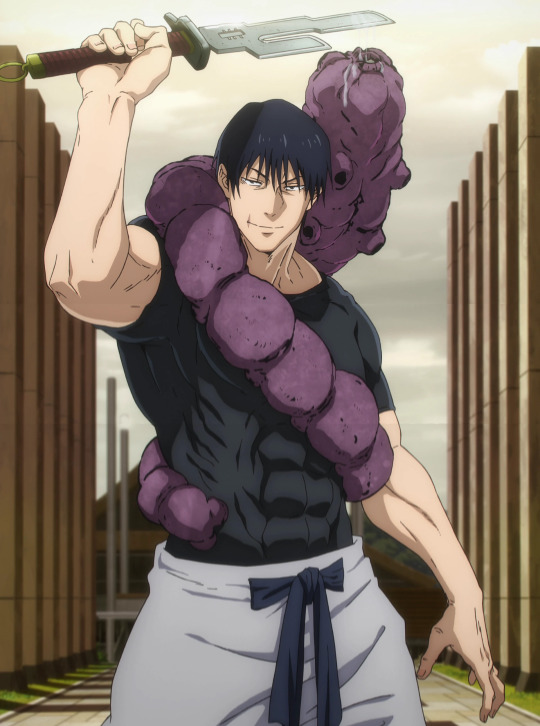
Like he represents everything a jujutsu sorcerer shouldn't be and uses EXACTLY those traits to solo both the sorcerers and the curses they work so hard to exorcise
The fact that he has NO cursed energy at all, what made him worthless in the Zenin clan's eyes, was exactly what sealed all their fates in losing to him is an INSANE twist to pull
(Yes there's Maki, but she feels more like she's trying to work within the system despite her limits (like the glasses she wears to adapt), unlike Toji who is totally free due to overwhelming raw senses alone)
His introduction opened up a whole new way to see the power system of cursed energy while making complete sense with what has been established, for me at least
(I wasn't super interested in the jjk power system personally until Toji showed how its strengths can be the user's own weaknesses if exploited properly)
He is an iconic infamous stain on both the sorcerer world inside of JJK and to one of the most important characters which kicked off the whole plot
He EASILY solo'd the world's most powerful sorcerer at the time- someone who represents everything that is the opposite of himself- with base planning and strategy
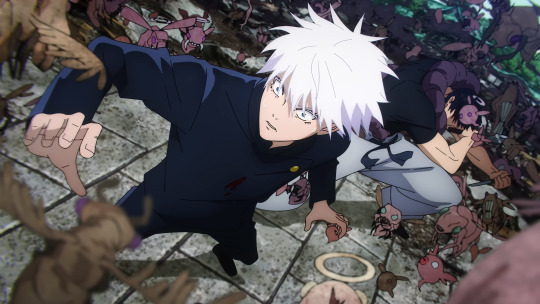
Didn't break a sweat the entire time
But despite all this power he has, despite the reputation he has for his strength, despite seemingly killing the world's strongest sorcerer at the time- the man was a deeply depressed and jobless bum
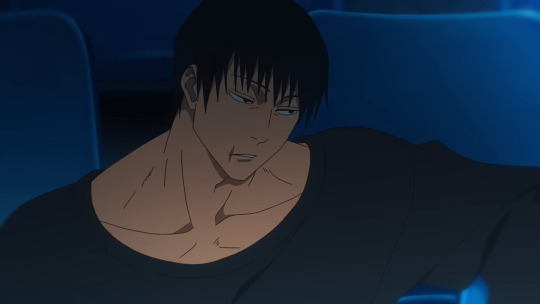
He is not any happier before or after his assassinations are done
Feels good in the moment then he's back to his life doing nothing but gambling his money away until the next job
This man who has beaten everyone of every age and species now in the series (he said these hands are rated E for everyone) was actually a WIFE GUY
He was living a shitty life in his clan who abused and feared him but found fucking LOVE and turned his ENTIRE life around for ONE PERSON to be a normal man, even having a child with her
And after she dies he spirals into deep depression, to the point he is incapable of being a good father; he knows on some level that his mental state is so bad he couldn't take care of Megumi properly- THAT is how DEEPLY he loved this woman
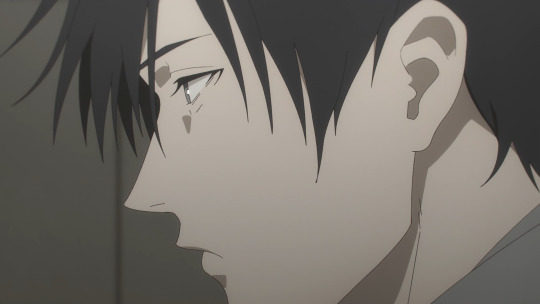
HE SOLD HIM THO WHICH IS TERRIBLE
BUT AGAIN
Showing how he's shit (making money from it) but also tries in his own way (I'm too mentally fucked up so a proper family should take care of him)
Then just looking into Megumi's eyes during his zombification knocks his consciousness back into himself, showing if there was one thing he truly cared about during his final moments, it was his son
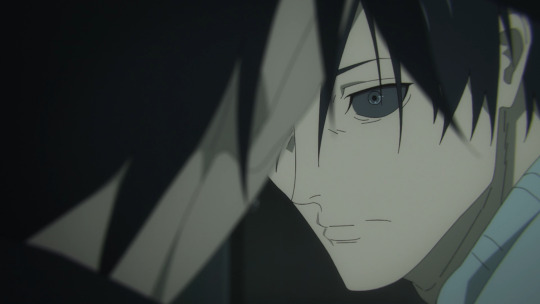
Then sacrificing his life for his son in the end without asking for anything but his name to rest in peace
BUT ALSO HE MURDERS EVERYTHING WITHOUT REMORSE LIKE?
THE JUXTAPOSITION????
Literally kills teenagers and even during his final moments and his comeback he doesn't give a shit
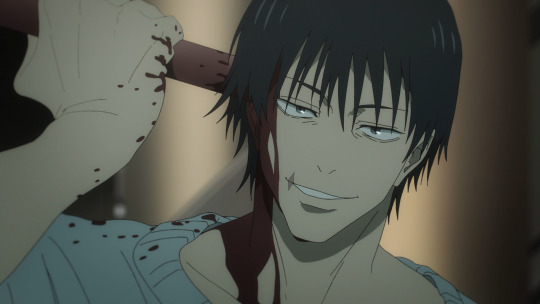
Like he did a crazy anime fight to kill Gojo which was brutal but still a cool magical fight to watch
Then he fucking snipes a teenage girl in the head with a gun
A plain gun
No crazy stunts
No regrets
THE GOAT? 😭
ALSO THE WAY YOU CAN TELL GEGE LOVES HIM LOL
You could easily write his zombie ass out of the Shibuya Incident Arc but the man wanted to draw him again so bad he made room for necromancer granny to kick start the GOAT's return for a hot sec
HIS FIGHTS ARE SO COOL LIKE HE DON'T GOTTA RELY ON ANY SORCERER SHIT JUST HIS HANDS AND AN INVENTORY ON HIS SHOULDER ARE ENOUGH ITS SO RAW THAT HE CAN GO HEAD TO HEAD WITH WIZARDS AS JUST A DUDE AND WIN
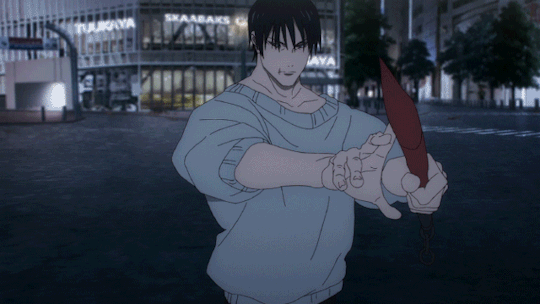
#jjk#jujutsu kaisen#toji fushiguro#sidrabbles#more to add but the summary of it#megumis mom i need tips how did you catch him
88 notes
·
View notes
Note
ok top ten harrowhark moments
ok let’s seee… little rat girl i love her so much
10. when she spent all night burying bones in the dirt so that she could win the fight with gideon
9. when she coined frontline titties of the fifth. so fucking iconic
8. when gideon was carrying her after bone cocoon and she woke up to complain after palamedes negged her
7. when she invented a coffee shop au where she and gideon could be happy
6. drawer bread
5. the tomb break in
4. when her best frenemy needed a new arm and she made it sexual
3. “i said a necromancer alone. i have you. we bring hell”
2. her entire pool scene rant
1. SOUP
285 notes
·
View notes
Text

"A necromancer alone can't bring that down, Griddle. That's regenerating bone." "I'm not running, Harrow!" "Of course we're not running," said Harrowhark disdainfully. "I said a necromancer alone. I have you. We bring hell." — Tamsyn Muir (Gideon the Ninth (The Locked Tomb, #1))
My biceps might be neither enormous nor huge, but they are muscular. You want to get to the Reverend Daughter, you go through me.
(Going to repaint that hilt, at the very least.) (Also sorry for being a pasty-ass-skinned northerner, I know both girls are supposed to be not-pasty-ass-skinned.)
#One flesh one end#Reverend Daughter#gideon cosplay#gideon the ninth#griddlehark#harrowhark cosplay#the locked tomb#tlt cosplay#The Ninth House#Harrowhark Nonagesimus#Gideon Nav#the locked tomb cosplay#GriddleHark cosplay#gideon the ninth cosplay#harrowhark nonagesimus cosplay
31 notes
·
View notes
Text
Thoughts on Lichdom by Marilys Ingellvar
Bit of a stream of consciousness on behalf of my Rook, prompted by playing through Arrangements a few days ago and wondering what they might actually think. Under the cut for spoilers, cw for death/fear of death, alcohol use and drug use. (Also, tag @redheadsramblings because I was about to post this anyway - might as well tag you in the whole thing rather than just 8 sentences!)
Emmrich wants to become a lich. That was the first revelation on a tour around the Memorial Gardens, which by turns saw them gather flowers and pay their respects to Rupert and Elannora Volkarin - his long-deceased parents - and share their first kiss (and second and third kisses) at the base of some impressive statuary. A single flower, Shrouds Bloom, is still pinned to Rook’s lapel. At the time, they’d said that the proposition was no stranger than anything else their order encountered. That remains true, in aggregate. Specifically - to Rook - the idea is lodged like a bile-stone somewhere in their gut. They don’t head back to the Lighthouse straight away.
Rook needs to buy reagents, a task for which they don’t need company. They reassure Emmrich with a fourth, tender, kiss that the distinction is between need and want. He is wanted. But they need some time alone. They neglect to tell him that their destination is a seedy bar on the wrong side of Nevarra City, a purveyor of illicit and inscrutable substances for merriment and mortal ill. If the professor had ever had cause to visit such an establishment, it would not be proper now. Even Rook raises their hood, their blonde bow braids and bright eyeshadow becoming a little too recognisable. They hand their shopping list to the clerk and sit with a glass of amber spirits and a line of something questionable. They won’t go home until the effects have worn off, and they will bring a gift. Gifts. Waiting out the high will buy them time to think.
Emmrich has a fear of dying. This, Rook knows. They have witnessed it first hand at Weisshaupt, where his increasingly measured and cheery responses to the destruction around them barely masked the simmering panic beneath. It had been hard not to grab him by the shoulders and slap it out of him, not that there had been time for it. Then again, near Lavendel, about to face down the blighted dragon. It was more acute then. The necromancer standing straight, but gripping his staff until his knuckles turned bone white; his voice silent, but his breaths gasping like a man drowned or buried six feet under. He got over it. He always has. But this is a fear which haunts him worse than any malign spirit: not the certainty of death but the uncertainty. When and how it would happen. What might be left behind. Lichdom offers that certainty. Emmrich will die, and then he will remain. Free of that fear. Unless he doesn't. Unless the ritual fails to come to pass. Then he will just… die. And what might be left behind, then? Rook takes a top up of their drink as their first provisions are brought back from storage. It burns on the tongue, like the funeral pyres their culture loathes, but they down it anyway.
What will happen to Marilys once Emmrich is gone? Rook finds it hard not to think of themselves by that name, their given name, in relation to the professor. Not since they let it slip some few weeks before. They have only known one another perhaps a month more than that. Marilys has always had a healthy attitude towards death - or at least as much as one can have, having been found in a crypt as an infant. Death is the boundary which defines life. You live, you love, you cry, you fight. And then you die. Emmrich worries - they know he worries - about the age gap between them. He has remarked that he has grey hairs older than Marilys themselves. What can he offer them? As if he is some invalid at the end of his ninth decade, not a man fit into his fifties. He has his hair, his teeth, his eyesight. No noticeable afflictions of the spine, the joints. He has years left to give, years Marilys would share willingly. Time they would cherish were it to only last a day - which seems like all any of them can ask for at the minute. But if they succeed - if Marilys, Rook, and the Veilguard save Thedas, then all the years he has left will be theirs. Lichdom would rob them of that.
Not the time: they would still have Rook’s lifespan. Not the companionship, nor this frilly, spark-hot passion which oscillates between them like an errant wisp. Emmrich's soul will still be his own. The Lich Lords can't have existed for as long as they have without exploring acts of physical intimacy; they do not cast all partnerships asunder with their flesh. But to Rook, to Marilys… the thought of one day losing Emmrich is part of what makes this new romance all the sweeter. Their time together is an empty vessel into which it can all be poured. He will be loved. He will be mourned. How do you have a legacy if you leave no-one behind? In quiet moments. Emmrich has stated precisely what he craves. Rook saw his eyes light up in the Gardens, when they promised his parents they would never leave him lonely. He expressed concern about what will happen to Manfred, when he one day passes (it is a stupid question, Manfred will be treasured by Rook all the same). But what will happen to Emmrich when everyone else is gone instead? Is witnessing death after death after death of those you care about worth avoiding the finality of your own? It is, Marilys thinks, a perversion - as within the bounds of Mourn Watch normality it might be. They don't have the words to tell him that.
“Here you go, love,” the proprietor says, setting down the last of the supplies. “Running low on the flasks you like, but ask the apothecary down by the wet market. If you don't mind what's been in ‘em, they might have a few to spare. Anything else for the road?”Rook takes another line, and they'll take a long walk. Gathering gifts that say I care for you, please kiss me again, stay with me. Cookies. Good beeswax candles. A small bead to add to the chain that runs from his left wrist to his thumb, a partner to the one they've had installed as a ball capture on a helix piercing. It's selfish, but they hope it works. Hope one day they can find the words to have this discussion for real. Because Emmrich Volkarin may fear death, but Marilys Ingellvar would and will fight gods to convince him to live with them first.
#datv#datv spoilers#dragon age the veilguard#dragon age the veilguard spoilers#emmrook#emmrich x rook#emmrich volkarin#rook ingellvar#non binary rook#cw fear of death#cw alchohol#cw drugs
21 notes
·
View notes
Text
Alecto was the first body John ever made. And G1deon was the second, regrown from just an arm.
And if G1deon is anything to go by, John isn't very good at making bodies:
Unlike the other Lyctors, all of whom skewed hungry, soft men and women of the necromancer build, his frame carried nothing but muscle. He was sinew over bone. He was a walking tendon. He had a raw, stretched look to him like an idiot’s construct, bones that had been slippered in meaty fibrils to keep them moving. A metabolized, contracted striation, without fat, the only curve a hollow tautness from rib to stomach.
John had grown up with G1deon and knew what he looked like. He might even have been able to scrounge up a picture from somewhere. He presumably had time to think about reconstructing his body and was able to take time to do it. And yet, G1deon looks like this:
It was a man who looked like he had been stripped bloody by a wind machine and hadn’t healed up all the way; a wiry, knuckled-up tendon of a man, with the face of someone who had been starved once and burned recently.
If that's what a body he constructed with premeditation and planning and concentration looks like, how does one he made under more pressure look?
I wanted to make you the most beautiful body I could think of. He paused and said: “But I was stressed, okay? I was insane. Most of what had made me John had gone somewhere else. There were a few little thoughts left … a handful of things that made me me … a couple scraps of id. It’s not fair to judge me, right? I didn’t do this thinking … I didn’t do it like art.
John seems to think there's something to apologise for in Alecto's body.
We do get a description of Alecto, from Harrow's memories of her attempted divine murder/suicide at the age of 10:
God’s victory and death was a girl. Maybe a woman. At the time Harrowhark had not known how to tell, and the gender was only a self-interested guess. The corpse lay packed in ice, wearing a white shift, her hands clasping a frost-rimed sword, and she was beautiful. The formation of her muscles was perfect. Each limb was a carved representation of a perfect limb, each bloodless foot the lifeless and high-arched simulacrum of the perfect foot. Each black and frosted lash lay against the cheeks with perfect still blackness, and her nose—it was the pinnacle of what a nose should be. None of this would have broken Harrow’s spirit except that the mouth alone was perfectly imperfect: a little crooked, with a divot in the lower lip as though someone had softly pressed a dent into the bow with the tip of their finger.
Maybe Alecto is the perfect specimen of womanhood. Maybe Harrow was ten and had never seen anyone young and not swathed in vestments before and the bar was very low. Maybe Harrow just has very particular taste in women.
But between G1deon, John's apologies, that "high-arched simulacrum" of a foot, and Kiriona - Gideon, now with Extra Teeth - I have a feeling she doesn't just look like a regular blond lady.
529 notes
·
View notes
Text
Whenceforth art thou, Hell?
Nona the Ninth appears to confirm Abigail Pent's suspicion that the River has been deliberately broken or sealed, per the comments of Varun and Alecto:
The Captain’s voice was like old teeth. “He left them too long—you left them too long, my salt thing.” ... Afterward Alecto went down to the ship and stood before John, purposing to travel through the River, and was grieved to find it yet dead.
However, a common thread of discussion I see in theorycrafting goes that if John has closed whatever gates may lead beyond the River, then his actions here are somehow for the sake of sustaining necromancy as an institution - as if, at the eleventh hour, we'll learn that all magic has somehow been fueled by burning through God's giant Philosopher's Stone all along. I cannot accept this interpretation. To me, it raises an infinite regression: how could John possibly have used necromancy in order to invent necromancy?
Moreover, this kind of plot twist disregards the internal logic and deflates the significance of TLT's social critique. The Tower doesn't need to be a secret hydroelectric dam in the River for converting human damnation into worldly power, because the engine of suffering has been in the real world the entire time, and it's just called colonialism. The price to be paid for working necromancy is a price to be paid overtly and in this life, either by the coin of explicit necrocapital or by the coin of grief.
If the path to a hypothetical River Beyond has been closed, I think it's for a much more banal psychological reason: John is a mission-oriented avenger who refuses to accept any check on the reach of his judgement.
“There can be no forgiveness for those who walked away,” he said. “Just as there can be no forgiveness for me—even though I rip the very fingers from my hands … throw them into the jaws of the monsters who hunt me … as I run from them across the universe, end to end. Something will satisfy them eventually, but nothing satisfies me. Nothing.” He drew his gaze away from her—his black-and-white, chthonic stare—and looked out over the dunes. He said, “But that’s the grace of it, Harrow. If I’m God, I can start over. The flood, you know? You can wash things clean. That’s all the end of Earth was … making things clean. It gets dirty again, you clean it again. Like those old power-washing ads. Spray and walk away, right? Sometimes I think the only reason I haven’t done it already is that I can’t bear the idea that I wouldn’t be able to touch them—that they’d still be out there…"
People regularly overlook the psychological significance of John's long reach in the context of understanding his behavior. Death and physical distance are no escape from a sufficiently powerful necromancer, because his enemies can be summoned out of the River - which bridges locations across unimaginable gulfs of space - and subjected to further torments in person.
(this is another reason I don't believe that John's expansionist project is being carried out in order to hunt down and slaughter the resettled generational descendants of the trillionaires; based on what we've read, John simply shouldn't need to settle for such a pointless blood feud, let alone carry out his revenge-by-proxy in the physical world. however it came to be that the dead are trapped within the River, everyone who lives is certain to enter his kingdom of death eventually, to sit and wait for him to sieve them from the waters.)
From here, it also makes sense on John's part to arrange for a specific place for the interment of problematic souls. He has to be able to keep some people pinned in place in the palm of his grave-dirt hand - otherwise he leaves a potential attack surface for anyone to try to summon the dead as their witnesses and ask for incriminating information about the King Undying. John certainly admits to deliberately leaving many souls on ice in proportion to their moral desert, for which Harrow accuses him of malfeasance:
"We’ll get them all back … some of them, anyway … or at least, the ones I want to bring back. Anyone I feel didn’t do it. Anyone I feel had no part in it. Anyone I can look at the face of and forgive. And my loved ones … The ones I left, I’ll bring back." ... "I want to know how many of the Resurrection are left, and how many you began with, and what the discrepancies are. I want to know where you put them. They didn’t go into the River. I want to know why she was angry … and why you were terrified."
Alecto The Ninth is set to invoke the harrowing of hell, but I still think we have to be very careful not to overstate these mythological allusions or buy into John's mystique here. The Locked Tomb is a setting with an intensely organic and visceral metaphysics, where the embodiments of the divine - Alecto and John, John's hands and gestures, the human soul itself - are "merely" congregations of smaller powers. "God is a dream, Harrow, and you all dream me together" - the secular minutiae of life and magic are divine only where we remember they're worth deifying!
As John's godhood was once demystified to expose him as an oversized Lyctor, if I want to understand the nature of Hell and the Tower in advance of Alecto, I think I have to let go of my assumption that the answers to all of these questions isn't hidden in plain sight, that there must be a dizzying twist. Let's assume a man did it, and not a god; and ask, how would any man go about trapping ten billion souls or damming the River?
36 notes
·
View notes